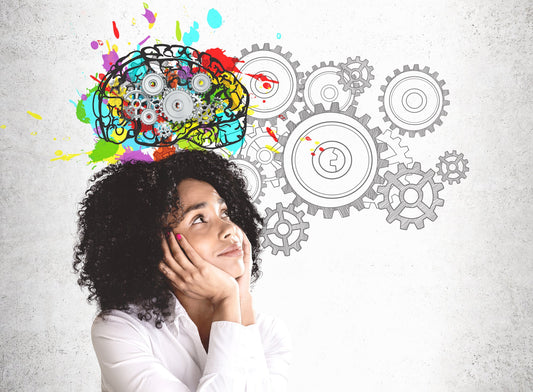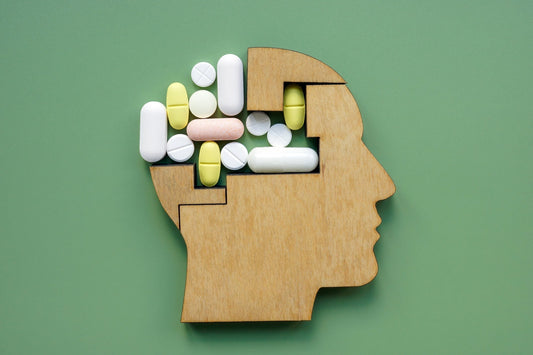Child brain development is a serious and complex topic. The way we can’t imagine life without water and electricity, we also can’t imagine life without a brain, right?
The early years (birth—7 years) of a child's life become the foundation of a growing brain, just as the invention of the bulb laid the foundation of the modern world. Remember Thomas Alva Edison, who invented the lightbulb?
He was labeled as “difficult” by his teachers and got pulled out of school at a very young age. Thanks to his nurturing mother, he got homeschooled after that and grew up into someone so creative and far more intelligent.
Children’s brains are like seeds; they turn into plants with time and finally become healthy trees when ready. This shows the right environment can boost creativity and intelligence.
Let’s understand the stages of brain development, when does the human brain fully develop, and factors that can significantly affect its growth so you can help your child in the right ways.
How the Human Brain Develops?
The human brain is made of approx 100 billion cells called neurons. Each neuron is linked to tens of thousands of other neurons through a connection called synapses. Synapses help neurons communicate with electrical signals. Together, the neurons form a network and communicate information to each other. Synapse connection changes with experience, known as neuroplasticity.
The network of neurons processes a large amount of information and helps you do everything. It includes controlling other bodily functions like heart rate and breathing, sensation, coordinating movements, and your ability to think, feel, remember, and learn.
As we grow, different areas of the brain, each responsible for specific tasks, grow together. Our brain constantly develops and adapts through life.
Piaget vs Vygotsky
Jean Piaget and Lev Vygotsky are the two most influential figures in the field of child brain development. Vygotsky admitted the role of curiosity and active involvement in learning in brain development but placed greater emphasis on external factors like society, culture, and people.
Meanwhile, Piaget believed that the process of development stems from within and acknowledged external factors as less important.
Stages of Brain Development in Early Childhood
The basic architecture of the brain stems from an ongoing process that starts before birth and continues into adulthood. Jean Piaget's theory suggests that brain development happens in stages, and every stage helps us develop in various ways and aspects of life.

By having an understanding of how that works, your children learn how to love their brains and grow up into someone who is kind to themselves and those around them. Those stages contribute to development like this:
Sensorimotor Stage (Birth to 2 Years)
Sensorimotor stage is when infants and toddlers start developing their cognitive abilities. In the first 2 years of life, the brain develops at 90% of its adult size. During these dynamic 2 years, your children experience and learn through their basic reflexes, senses, and motor responses.
Major cognitive development milestones that occur during the sensorimotor stage are:
Sensory exploration: Learning through exploration and their five senses. They learn about their environment through movements and sensations.
Object permanence: Beginning to understand that objects continue to exist even when they cannot be seen, also known as “object permanence.” They learn that they are separate from the people and objects around them.
Basic problem solving: Understanding the cause and effect of their direct action in their environment.
Basic motor skills: Learning basic movements like sucking, listening, looking, grasping, and more.
Preoperational Stage (2 to 7 Years)
The preoperational stage of cognitive development is highly significant for the child’s language development. The emergence of language is the major part of this stage.
Major cognitive development milestones that occur during the preoperational stage are:
Language development: Their vocabulary expands, and their language and thinking abilities get better, but they will still think concretely about the world around them.
Egocentric: Children become “egocentric” and have trouble seeing things from other people’s perspective.
Thinking symbolically: Children start thinking symbolically. They learn to use words, images, and symbols to represent objects.
Pretend play: Increase in the development of creativity with pretend play. (For example, during pretend play, pillows turn into a fort, and a broom turns into a ride.)
Development Through Middle Childhood and Adolescence
Once children are 7 years old, they start a new journey of development, which takes them to adulthood. They go through transformations that shape them into someone new:
Concrete Operational Stage (7 to 11 Years)
During this phase, children learn to think logically and systematically by developing their logical thinking and reasoning. They gain a clear understanding of how the world works and how others might view a situation. At this stage, they still struggle with hypothetical and abstract concepts.
Major logical development milestones that occur during the concrete operational stage are:
Logical reasoning: Learning to solve problems more logically and grasping the cause and effect relationship.
Understanding conservation: Begin understanding that quantity doesn’t change with the shape of the object. (For example, pouring water from one glass into a bowl doesn’t change the amount of water.)
Development of empathy: Begin to understand other people’s emotions and perspectives and become less egocentric.
Organizational skills: Learning organized thinking for thinking with clarity, but they will still think concretely.
Formal Operational Stage (12 Years to Early Adulthood)
The final stage of Piaget’s theory is the formal operational stage of development, where children learn abstract thinking. They learn how to think hypothetically and find solutions with logical reasons on complex topics.
Major abstract development milestones that occur during the formal operational stage are:
Abstract reasoning: Teens and adults learn to think about abstract topics like justice, love, freedom, etc. The development of abstract reasoning helps them with long-term planning.
Hypothetical thinking: Learning to think about possibilities and outcomes by testing hypotheses. They wonder about “What if” questions and come up with multiple solutions and possible outcomes.
Deductive logic: They use deductive logic, or reasoning from a general principle, and apply it to specific information. They think more critically and solve complex problems, which results in increased problem-solving abilities.
Moral development: Learning to distinguish right from wrong, developing their sense of morals and ethics. They begin thinking about philosophical, social, cultural, and political issues.
When Does the Brain Fully Develop?

The last part of the brain to mature is the prefrontal cortex. It is responsible for functions like decision-making, problem-solving, and impulse control. Cognitive and executive functions play a big role in behavioral control. These functions are covered by the prefrontal cortex, which develops independently of adolescence and continues to develop.
Studies suggest that during this sensitive period, you should not overprotect your children but allow them to make mistakes. Allow them to learn from their individual experiences and encourage self-regulation. Parents and teachers can help children during this time by listening and offering guidance and support.
Prefrontal cortex development being under construction can be a possible reason why teens and young adults struggle with risk assessment, perception, and long-term planning.
But when does the human brain fully mature? Well, the human brain development age is 25 years. So, most people have fully developed brains by their mid-20s.
Does Gender Play Any Role In Brain Development?
Research shows that in the core process of development, both male and female brains develop in similar ways. All a brain needs is a nurturing and supporting environment, and it can develop itself to its full capabilities. Even though Individual differences outweigh gender-based differences, there are still some subtleties that can make a difference. They are:
Language and social skills: Females develop language and social skills slightly earlier than males.
Spatial and motor skills: Males develop spatial and motor skills slightly earlier than females.
Factors Influencing Brain Development
Your children’s brains will try their best to develop in all the right ways. However, there are some factors which can influence how a brain develops. Some of those are:
Genetics and Biological Factors
Genes passed on from parents to children play a significant role in the basic structure and functioning of the brain. Neurodevelopmental disorders like Autism, ADHD, and dyslexia can also be influenced by genetics.
Biological factors like a mother's health during pregnancy or intake of certain nutrients can also leave a lasting impact on a child’s brain development.
Environmental Influences
Especially during the early years, the surroundings in which your children grow can have a significant effect on the development of their brain.
A positive environment, such as a loving caregiver, proper nutrition, safe surroundings, and a healthy surrounding, can nurture a healthy brain. On the other hand, neglect, abuse, malnutrition, unsafe surroundings, and stress can hinder development.
The Role of Play and Learning
The role of play and learning experiences is crucial for shaping neural pathways and the creation of strong brain connections. Your children play and learn through their experiences. Through play, your children learn social skills, problem-solving, and creative thinking that eventually strengthen their cognitive abilities.
What Can Hinder A Child’s Brain Development?
Every brain develops in different ways under different conditions. Some factors that can interfere with a child’s brain development are:
Chronic Stress
Chronic stress is one of the most influential factors that can disrupt a child’s mental development. Experiencing high levels of stress during childhood releases excessive amounts of cortisol hormones. High levels of cortisol release can shrink the areas of the brain like the hippocampus, which is responsible for memory and learning.
For example, a child who grows up in a household where parents argue frequently or experiencing a divorce can be vulnerable to chronic stress.
Poor Nutrition
Lack of essential nutrients like omega-3 fatty acids, iron, zinc, iodine, and vitamins during key growth periods can affect brain cell formation and communication. Proper nutrition is essential for the development of a healthy brain. Malnutrition and undernutrition can also cause cognitive impairment or delayed development of the brain.
For example, children who suffer from iron deficiency may develop anemia, causing fatigue and a decrease in cognitive functioning.
Limited Stimulation
Children need a good amount of stimulation through interactions, engagement, and opportunities to learn to develop critical brain pathways. Lack of exposure to sensory movement can interfere with neural connections. Additionally, lack of engagement can affect their social and emotional development.
For example, children in isolated living conditions, whether voluntary or involuntary, may miss out on critical learning opportunities.
Environmental Toxins
Exposure to toxins like lead, mercury, or pesticides can significantly affect brain development in young children. It can affect cognitive abilities and result in behavioral problems. Parents and caregivers can provide better hygiene, diet, and cleaner living conditions for the development of a healthy brain.
For example, children who get exposed to lead may experience lower IQ or increased behavioral problems.
Bringing It All Together with the Four Circles of Brain Health
To bring it all together, using the Four Circles of Brain Health, we can understand child brain development holistically. These circles—Biological, Psychological, Social, and Spiritual—interact to shape how a child’s brain grows from birth to adulthood.
- Biological Circle: The brain’s development involves neurons and synapses constantly adapting through neuroplasticity. The proper nurturing of biological needs, like sleep, nutrition (including essential nutrients such as omega-3s), and exercise, forms the foundation for healthy growth. Each stage of cognitive development, from sensory exploration as an infant to abstract reasoning in adolescence, depends heavily on the integrity of this biological infrastructure.
- Psychological Circle: Cognitive milestones, such as problem-solving and emotional regulation, emerge from both internal curiosity and guided learning. Influential theories by Piaget and Vygotsky highlight that children’s brains thrive with both structured learning and opportunities for exploration. Supporting children in recognizing and managing emotions fosters resilience and mental clarity, contributing to a healthier sense of self.
- Social Circle: A child's environment—caregiver relationships, cultural context, and peer interactions—plays a crucial role in brain development. Positive social connections are essential for nurturing empathy, language acquisition, and creative thinking. Play, for example, strengthens social skills and cognitive pathways. Conversely, chronic stress or neglect can disrupt brain growth, reinforcing the importance of a loving, stable social environment.
- Spiritual Circle: Children also benefit from having a sense of purpose or belonging, which can come from faith, family values, or connection to larger communities. Teaching children about mindfulness and gratitude promotes mental well-being and self-regulation, helping them navigate life's challenges with clarity and compassion.
By addressing all four circles together, parents and educators can foster an environment where a child’s brain not only grows but thrives, equipping them to face life’s challenges with resilience and adaptability. Brain development does not happen in isolation; it reflects a dynamic interplay between biology, thoughts, relationships, and a sense of meaning. This comprehensive approach ensures that children are prepared to love their brains and use them effectively to live fulfilling lives.
Conclusion
It's nearly impossible for any parent to leave their children on their own in the world. In fact, children need their parents no matter how old or mature they get.
However, it's crucial for children to understand and learn about their minds. So, when they face life, they know which part of the brain is under development and what they are learning from that experience.
The basic principles of neuroscience also indicate that early preventive intervention can be more efficient and produce favorable outcomes than executing remedies later in life. So, why not give the children the education they need in the early stage of their life?
With that in mind, Brain Thrive Pre K to 1 was introduced. It is an innovative initiative for children to help them understand their brains in a way that makes life and development easier for them. It is an evidence-based program that is designed to promote optimal brain health and cognitive development in young children. So, give your child the tools for success by nurturing their brain development.
Thanks for reading!

 Amen University
Amen University








